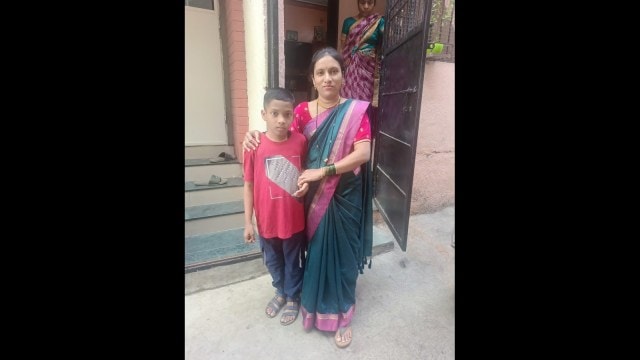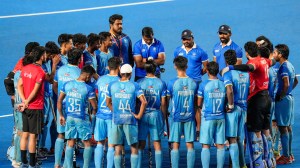Click here to join Express Pune WhatsApp channel and get a curated list of our stories
How this pioneering centre continues to be a haven for children diagnosed with autism for the past 25 years
Founded in 2000 by the late Padmaja Godbole, PAC began with just a couple of children and a few teachers in a single room.
 When mainstream schools refused to admit Shreyash, a child diagnosed with autism, his parents turned to Pune’s Prasanna Autism Centre.
When mainstream schools refused to admit Shreyash, a child diagnosed with autism, his parents turned to Pune’s Prasanna Autism Centre.
Written by ARYESH CHAKRABORTY
When two-year-old Shreyash did not speak, avoided playing with other children, and struggled to sit still, his parents thought he would eventually catch up. But as years passed and his younger sibling began reaching milestones, Shreyash could not. It became clear that something was different.
“We noticed it around the age of two years, but it was only after our second child was born that the comparison made it clear – there was a problem. He didn’t speak properly, he didn’t interact, and he never sat still,” said Sangita Pradip Shibe, Shreyash’s mother.
Doctors later diagnosed him with autistic spectrum disorder, a developmental condition that affects how a person communicates, interacts socially, and processes the world around them.
For Sangita and her family, the relief of finally having a name for their son’s condition was quickly replaced by frustration, as mainstream schools turned them away. “They said such children don’t sit in one place. And it was true- at that time, he really couldn’t. We felt helpless,” she expressed.
That sense of despair shifted when they found Prasanna Autism Centre (PAC) in Shivajinagar, Pune, an NGO that has been working exclusively for children with autism and with special needs for the past 25 years.
Founded in 2000 by the late Padmaja Godbole, PAC began with just a couple of children and a few teachers in a single room. Today, it serves 32 children, offering therapies ranging from speech and occupational therapy to behavioural intervention and special education. Each child receives an Individualised Education Plan (IEP), tailored to their special needs.
At the helm now is Sadhana Godbole, Padmaja’s daughter and the centre’s managing director. With a degree in child psychology, she brings both academic understanding and personal commitment to her role. “There is no special treatment for this disorder, nor is there any proven science behind why it occurs. What helps is therapy, structure, and above all, patience,” she told the Indian Express.
“My background has helped me understand the therapeutic and emotional needs of children. But just as important is the involvement of parents. Families often come here feeling isolated, sometimes even ashamed. PAC is not just about therapy- it’s about giving parents hope and making them feel they’re not alone.”
PAC has also incorporated unique methods into their syllabus to help children connect with the world around them. One of its most successful initiatives has been trained dog-assisted therapy. “It helps children reduce anxiety, build trust, and learn social behaviours in a natural way. For children who find it difficult to connect with humans, sometimes connecting with an animal opens a new door,” explains Sadhana.
For Sangita and her son Shreyash, the results have been transformative. “In the first year, there wasn’t much improvement. But in the second year, we saw changes- he began sitting with us and even with other children. This year, the improvement has been even more. He eats properly, follows instructions, and listens. We are delighted to see the steady steps he is taking,” she noted.
The progress may be gradual, but every milestone matters. Sadhana explains: “Even the smallest achievements are celebrated here. When a child learns to communicate a basic need for the first time, it is a victory. The smile on a parent’s face at that moment is what keeps us going.”
The prevalence of Autism in India has been steadily rising, with a 2021 study in the Indian Journal of Pediatrics(IAP) estimated it at 1 in 68 children. Boys are affected more often than girls, at a ratio of about 3:1. Yet, early diagnosis and intervention remain inadequate, as many parents lack awareness of Autism, its impacts, and available support. Experts stress that early detection is key to helping children with ASD lead to more productive lives.
Running PAC has not been without challenges. As an NGO, it faces constant financial constraints, relying heavily on donations and community support. Beyond resources, the team also battles societal stigma around autism, which often leaves families feeling marginalised.
Despite these hurdles, PAC has emerged as a lifeline for numerous families for over two decades. Sadhana highlighted that PAC blends therapy with co-curricular activities like art, music and dance. “These not only build motor and social skills but also bring joy and confidence. Childhood shouldn’t be limited to therapy- our children deserve creativity and fun too,” she says.
For the 32 children currently enrolled, the Centre is more than just a school. It is a place where they are seen, understood, and celebrated for who they are. For parents like Sangita, it’s a relief and a very touching moment to see that their child is speaking and communicating not unlike others.
(Aryesh Chakraborty is an intern with The Indian Express)
Click here to join Express Pune WhatsApp channel and get a curated list of our stories







